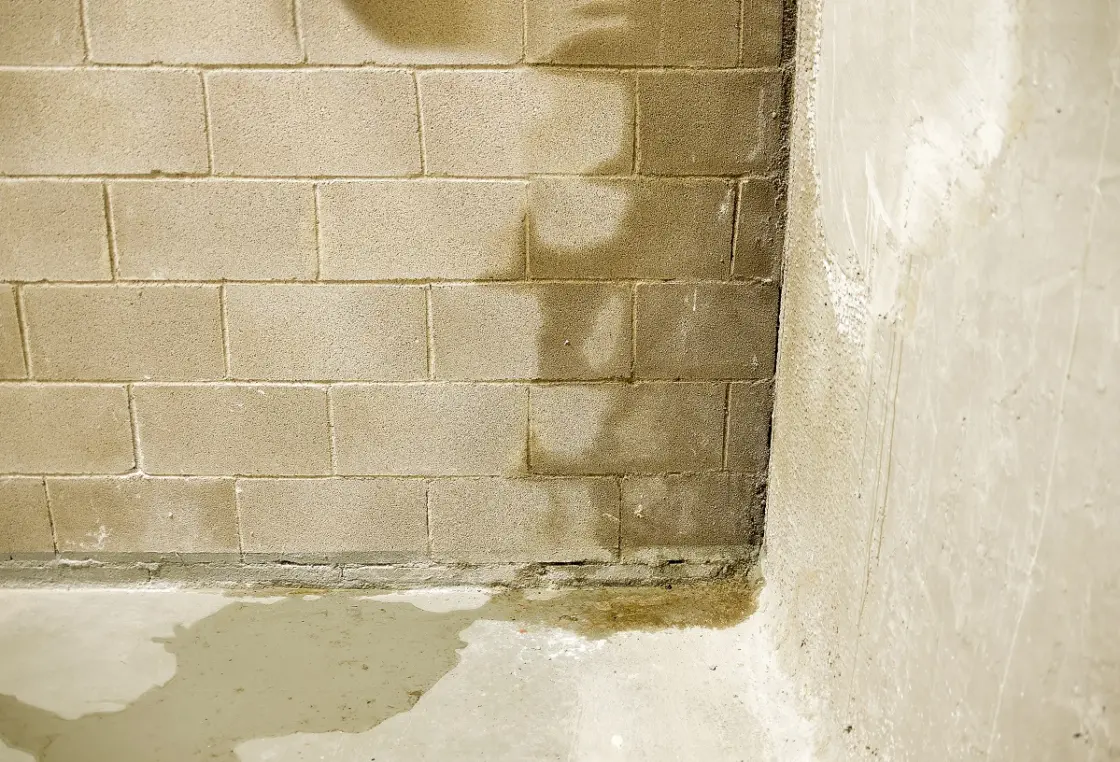How to Tell Where Water is Coming into Your Basement

Do you have water seeping into your basement? If so, you probably know how tricky it can be to figure out where all that unwanted water is coming from.
Tracking down the source of a basement leak can become quite a mystery, with so many suspicious culprits lurking in every dark corner. Don’t lose heart, though!
You can look for many signs to tell how and where water is coming into your basement, even before you call in the professionals.
In this guide, we’ll cover the most common entry points for unwelcome basement water, with the goal of helping you get the jump on those sneaky leaks before they become a bigger problem.
In this article:
- Where IS That Water Coming From?
- Keep Your Basement at Its Best
- No Leaks Left Behind
- Frequently Asked Questions
Where IS That Water Coming From?
Basement leaks are incredibly common and can come from almost anywhere. In older homes, there can be multiple minor leaks that, together, can create a big problem.
You’re going to need to take a closer look at your walls, windows, doors, and foundation to identify a root cause for the water that’s collecting on your basement floor or running down the walls.
Finding a Leak in Your Basement Wall

Your basement’s walls form part of your home’s foundation and are subjected to all the same stresses. Heavy, wet soil pressing in on them can gradually open up microscopic pores to push water through, eventually infiltrating interior space and causing further damage.
Luckily, you can inspect your own basement walls by eye. Look for deep staining on walls and peeling paint. These highlight steady leaks and often come coupled with mold.
If you come across any big, obvious signs of damage, like bulging walls or cracks of any kind, get a professional contractor or structural expert to help you assess the extent of the damage.
If nothing jumps out at you as a clear cause, you can switch from looking to listening and press up against a wall. Hear any drips, gurgling, or hissing sounds? If so, there’s likely a broken pipe in (or somewhere close to) the wall.
Identifying Foundation Leaks in Your Basement
Foundation porosity
Most cement foundation walls are fairly porous. An army of tiny holes can hold microscopic amounts of water that, with time and intense pressure, wiggle their way into the room.
Without a protective coating like rubberized asphalt, a waterproof membrane, or a layer of gravel to guard against wet soil, foundation walls gradually break down, allowing more and more water to degrade your basement.
Joints and gaps

Certain portions of your wall are particularly susceptible to water damage and deterioration. The cove joint—where your foundation wall meets the floor—is a common weak link and can often allow moisture in through poorly sealed gaps.
This can also happen due to your foundation settling into the earth over time or simply succumbing to that pervasive hydrostatic pressure wet soil exerts on everything.
Look for bulging and buckling in foundation walls as well as openings between the wall and the floor to find issues like these.
You may find leaks among your mortar joints as well. Where blocks and bricks are brought together haphazardly, there may be gaps in the mortar that allow water to flow through freely.
Examine any stains on interior walls and get a good look at any blocks or bricks behind them. Wet bricks are a dead giveaway of a leak, and it may be time to call in a good repairman.
Gutter disrepair

Water-related foundation issues of any kind can be exacerbated by a bad set of gutters or a lack of good gutter maintenance.
When your gutters clog up, water can pour off your roof right into the soil surrounding your foundation, saturating it and contributing to the pressure it exerts on your home.
You can keep your gutters clog-free without as much maintenance and hassle by installing our award-winning LeafFilter gutter guards.
Handling Leaky Windows and Doors in Your Basement
Leaky window wells are a very common cause of basement floods, both big and small. If your window well is uncovered, there’s a good chance it could be contributing to your underground moisture problem.
If your house is on the older side, it may have shifted over time, causing cracks that could allow water to enter. Older homes often also have basement windows made of steel or wood which deteriorate with time. These may need replacing if this is where water is coming into your basement.
Keep Your Basement at Its Best
Now that we’ve gone over the most likely reasons basements leak, you should have a much better idea of what to expect and look for.
If you want to make your basement much less likely to develop leaks and take on water, the following tips will help.
Pay Attention to Pumps

A bad sump pump won’t do its job when you need it most. Take time to check in on yours every year and ensure it is working correctly.
This way, you minimize the potential for costly surprises when you really need your sump pump to pull through.
Have Damage Inspected
If you spot any damage to your foundation that you’re unsure about, you should probably bring in a pro for a serious assessment. Large cracks in walls can be the tip of the iceberg in terms of overall deterioration, signaling a need for more significant repairs.
Get Your Gutters Cleaned Out

You can’t keep the soil around your foundation from exerting pressure on it, but you definitely don’t want to make it worse!
Clogged gutters and downspouts will inevitably lead to water overflowing to the ground around your home’s foundation.
If you don’t want to deal with the ladders, brushes, gloves, and gargantuan effort involved in cleaning out your gutters, then it may be time to invest in gutter guards.
Our award-winning gutter protection system is professionally installed and comes with a clog-free guarantee, leaving you with a completely enclosed system that’s sure to keep out even the finest debris—including shingle grit and pollen.
No Leaks Left Behind
🏡With our expert team and innovative technology, we'll have your LeafFilter system installed in no time! ⏱️Visit our website at https://t.co/wSLoW1tLsl to learn more about our fast and easy installation process and say goodbye to clogged gutters for good! 👋 pic.twitter.com/5SA4uoH7fp
— LeafFilter Gutter Protection (@LeafFilter) July 13, 2023
It’s no small feat to discover where most basement leaks begin, but they all cost homeowners a lot of money when left unattended. Fortunately, simple home maintenance can make a big difference in avoiding these kinds of issues.
If you don’t want to handle foundation repairs and flooded basements, then it makes sense to pay more attention to your home’s gutters—your first line of defense against heavy rain, snow and ice, and water damage.
Our gutter guards have saved homeowners all over the U.S. countless hours of back-breaking labor spent cleaning out their gutters. That’s why our customers consistently give us excellent reviews and turn to our team for expert advice.
Call us today at 1-800-290-6106 toll-free or reach out through our contact form to get your free consultation and quote.
Frequently Asked Questions

How do you fix a water leak in your basement?
In order to fix a water leak in your basement, you’ll first need to know where the leak is happening. Once found, the source of the leak must be addressed, and the cause of the leak will need to be eliminated as well.
If your leak is coming from a window or door, you may be able to seal it up with caulk, but pervasive moisture on walls and other deeper issues must be resolved by professionals.
Should basement windows leak?
Your basement windows should never leak. If you notice a leak coming from your window, you should identify where water is entering and decide whether the entire window will need replacing.
How do you waterproof a basement floor?
You can waterproof a basement floor by stripping it of any finishes it may already have and treating it with an appropriate sealing compound. In most cases, you’ll need to choose a waterproof concrete sealer designed for indoor use.


